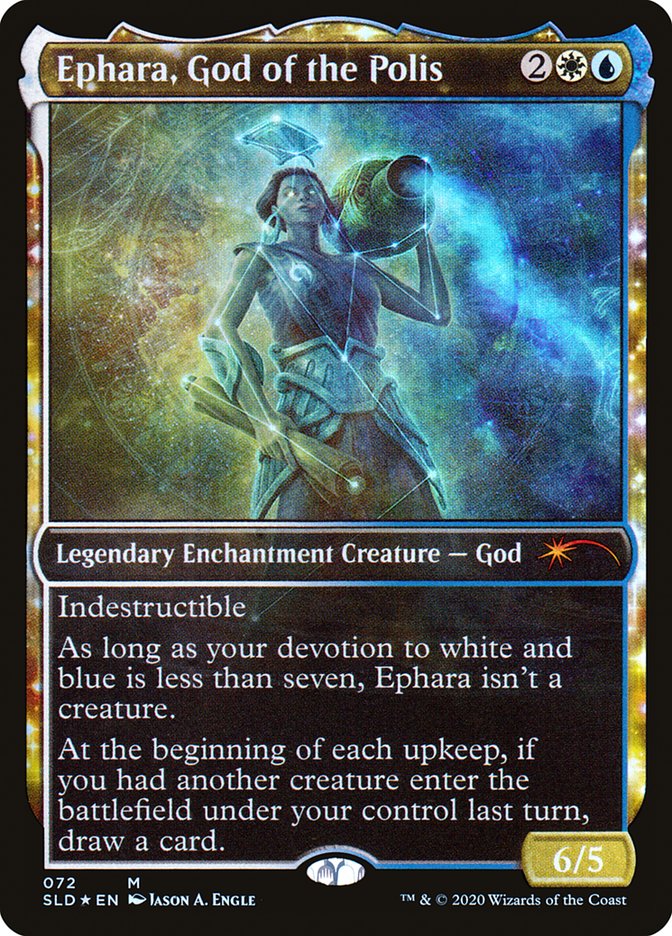
Ephara, God of the Polis {2}{W}{U}
Legendary Enchantment Creature — God
Indestructible
As long as your devotion to white and blue is less than seven, Ephara isn’t a creature.
At the beginning of each upkeep, if you had another creature enter the battlefield under your control last turn, draw a card.
6/5
Illustrated by Jason A. Engle
- Standard
- Not Legal
- Alchemy
- Not Legal
- Pioneer
- Legal
- Explorer
- Not Legal
- Modern
- Legal
- Historic
- Not Legal
- Legacy
- Legal
- Brawl
- Not Legal
- Vintage
- Legal
- Timeless
- Not Legal
- Commander
- Legal
- Pauper
- Not Legal
- Oathbreaker
- Legal
- Penny
- Legal
Toolbox
Notes and Rules Information for Ephara, God of the Polis:
- Numeric mana symbols ({0}, {1}, and so on) in mana costs of permanents you control don't count toward your devotion to any color. (2013-09-15)
- Mana symbols in the text boxes of permanents you control don't count toward your devotion to any color. (2013-09-15)
- Hybrid mana symbols, monocolored hybrid mana symbols, and Phyrexian mana symbols do count toward your devotion to their color(s). (2013-09-15)
- If an activated ability or triggered ability has an effect that depends on your devotion to a color, you count the number of mana symbols of that color among the mana costs of permanents you control as the ability resolves. The permanent with that ability will be counted if it's still on the battlefield at that time. (2013-09-15)
- Ephara's last ability checks at the beginning of each upkeep whether another creature entered the battlefield under your control last turn. If one did, it will trigger; otherwise, it won't. The ability will trigger only once no matter how many creatures entered the battlefield under your control that turn, as long as at least one did. (2014-02-01)
- The last ability will trigger regardless of what has happened to the creature that entered the battlefield on the previous turn. It doesn't matter whether it's still under your control or whether it's still on the battlefield. (2014-02-01)
- If a noncreature permanent you control (such as an Aura with bestow) becomes a creature, it will not cause Ephara's last ability to trigger the following turn. This is true even if that noncreature permanent became a creature the same turn it entered the battlefield. (2014-02-01)
- Your devotion to two colors is the number of mana symbols among mana costs of permanents you control that are the first color, the second, or both. If an effect counts your devotion to two colors, a hybrid symbol that is both of those colors is counted just once. (2020-01-24)
- The type-changing ability that can make a God not be a creature functions only on the battlefield. It's always a creature card in other zones, regardless of your devotion to its color. It's always a creature spell while it's on the stack. (2020-01-24)
- As a God enters the battlefield, your devotion to its color will determine whether any replacement effects that affect creatures entering the battlefield apply to that God. Because replacement effects are considered before the God is on the battlefield, the mana symbols in its mana cost won't be counted when determining this. (2020-01-24)
- When a God enters the battlefield, your devotion to its color (including the mana symbols in the mana cost of the God itself) will determine if a creature entered the battlefield or not for abilities that trigger whenever a creature enters the battlefield. (2020-01-24)
- If a God stops being a creature, it loses the type creature and the creature type God. It continues to be a legendary enchantment. (2020-01-24)
- The abilities of Gods function as long as they're on the battlefield, regardless of whether they're creatures. (2020-01-24)
- If a God is attacking or blocking and it stops being a creature, it will be removed from combat. It won't rejoin combat if it resumes being a creature later during that combat. (2020-01-24)
- Counters put on a God remain on it while it's not a creature, even if they have no effect. (2020-01-24)
- If an effect causes a God to lose all abilities, its ability that causes it to stop being a creature still applies if appropriate. (2020-01-24)